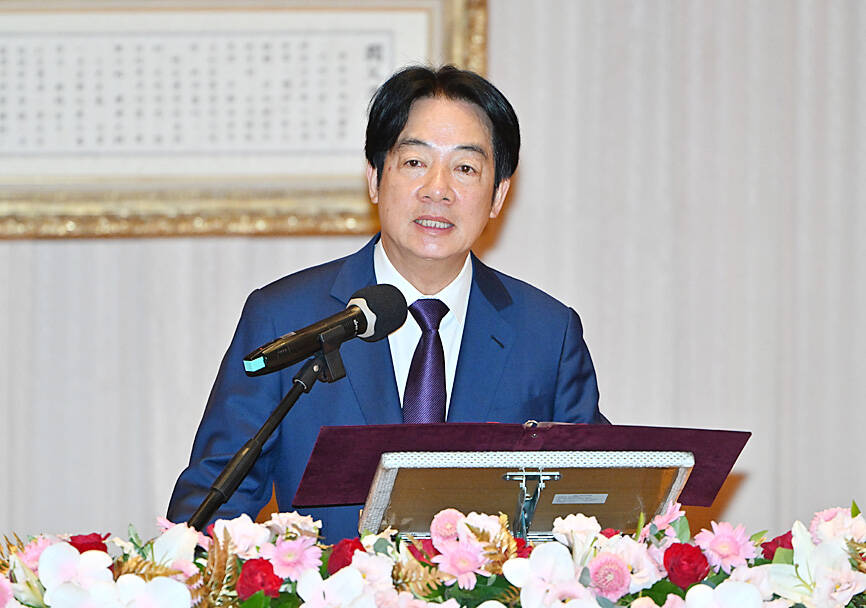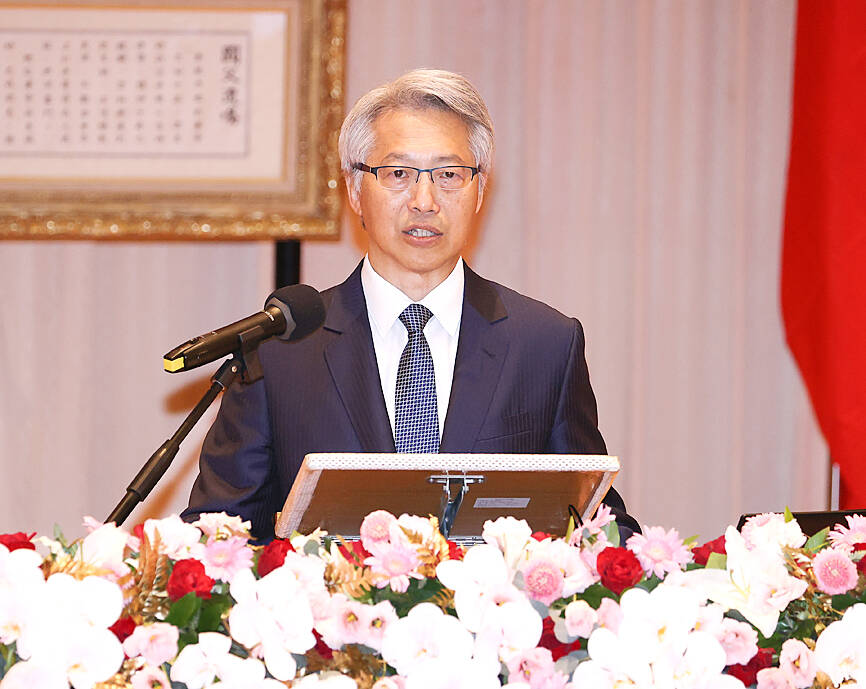President William Lai (賴清德) yesterday said he expects the nation’s academics to continue to boost the nation’s scientific research capabilities.
“Academia Sinica, being Taiwan’s highest research institution, has been leading Taiwan forward by offering advice on government policies,” Lai said in his opening address at the 35th Convocation of Academicians, which was attended by more than 200 academicians.
This year’s convocation, which runs until Thursday, is also to elect academicians and honorary academicians of Academia Sinica, the nation’s top academic institution.

Photo: Tien Yu-hua, Taipei Times
This is the first time the nominees’ Republic of China citizenship had to be verified prior to the election, and also the first time the biennial event was held with full in-person attendance at the institution in Taipei’s Nangang District (南港) since the COVID-19 pandemic.
Lai lauded Academia Sinica’s dedication to “cultivating talent for Taiwan in collaboration with universities on more than 100 course programs in the fields of humanities and social sciences.”
Academia Sinica developed the first quantum computer based on 5-quantum-bit chips in Taiwan, further assisting the Industrial Technology Research Institute in developing related modules and components and marking a significant milestone in Taiwan’s technological development, Lai said.

Photo: CNA
To cope with climate change, Academia Sinica collaborated with Taiwan Power Co (台電) in researching methane pyrolysis technology for electricity generation, in addition to cooperating in studies on developing geothermal power, solar power and ocean power to generate electricity, he said.
Academia Sinica also seeks to integrate artificial intelligence (AI) technology into medical and ecological applications in response to Taiwan becoming an “AI island,” while ensuring personal data safety for research fellows to access the information needed, he said.
Lai also thanked the institution for establishing the South Campus in Tainan, where he was elected mayor twice — in 2010 and 2014.
The contributions made by Academia Sinica’s academicians and researchers would lead Taiwan to rival the world’s best in scientific research and bolster the nation’s international influence, he said.
Academia Sinica President James Liao (廖俊智) said the institution has established an AI promotion office and would focus on how it can best be applied to humanities-based research.
The institution will take advantage of its rich humanities and sociology-related database to explore the use of AI in these fields while reviewing its impact on society, he said.
Noting that the AI boom has just started and raises many potential legal and ethical issues, he said that by promoting the deployment of AI in the humanities and social sciences, “we hope to let students who were interested in these areas but turned to AI realize that studying humanities and social sciences is a good way to apply AI.
Additional reporting by CNA

ENDEAVOR MANTA: The ship is programmed to automatically return to its designated home port and would self-destruct if seized by another party The Endeavor Manta, Taiwan’s first military-specification uncrewed surface vehicle (USV) tailor-made to operate in the Taiwan Strait in a bid to bolster the nation’s asymmetric combat capabilities made its first appearance at Kaohsiung’s Singda Harbor yesterday. Taking inspiration from Ukraine’s navy, which is using USVs to force Russia’s Black Sea fleet to take shelter within its own ports, CSBC Taiwan (台灣國際造船) established a research and development unit on USVs last year, CSBC chairman Huang Cheng-hung (黃正弘) said. With the exception of the satellite guidance system and the outboard motors — which were purchased from foreign companies that were not affiliated with Chinese-funded

PERMIT REVOKED: The influencer at a news conference said the National Immigration Agency was infringing on human rights and persecuting Chinese spouses Chinese influencer “Yaya in Taiwan” (亞亞在台灣) yesterday evening voluntarily left Taiwan, despite saying yesterday morning that she had “no intention” of leaving after her residence permit was revoked over her comments on Taiwan being “unified” with China by military force. The Ministry of the Interior yesterday had said that it could forcibly deport the influencer at midnight, but was considering taking a more flexible approach and beginning procedures this morning. The influencer, whose given name is Liu Zhenya (劉振亞), departed on a 8:45pm flight from Taipei International Airport (Songshan airport) to Fuzhou, China. Liu held a news conference at the airport at 7pm,

GRIDLOCK: The National Fire Agency’s Special Search and Rescue team is on standby to travel to the countries to help out with the rescue effort A powerful earthquake rocked Myanmar and neighboring Thailand yesterday, killing at least three people in Bangkok and burying dozens when a high-rise building under construction collapsed. Footage shared on social media from Myanmar’s second-largest city showed widespread destruction, raising fears that many were trapped under the rubble or killed. The magnitude 7.7 earthquake, with an epicenter near Mandalay in Myanmar, struck at midday and was followed by a strong magnitude 6.4 aftershock. The extent of death, injury and destruction — especially in Myanmar, which is embroiled in a civil war and where information is tightly controlled at the best of times —

Taiwan was ranked the fourth-safest country in the world with a score of 82.9, trailing only Andorra, the United Arab Emirates and Qatar in Numbeo’s Safety Index by Country report. Taiwan’s score improved by 0.1 points compared with last year’s mid-year report, which had Taiwan fourth with a score of 82.8. However, both scores were lower than in last year’s first review, when Taiwan scored 83.3, and are a long way from when Taiwan was named the second-safest country in the world in 2021, scoring 84.8. Taiwan ranked higher than Singapore in ninth with a score of 77.4 and Japan in 10th with